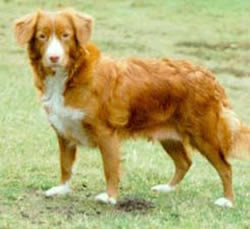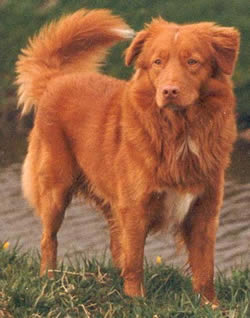Nova Scotia Duck Tolling Retriever
 Macbeth |
Photo with thanks to John Norris, www.tollers.com |
See more Nova Scotia Duck Tolling Retriever Pictures and Puppy Pics
Nova Scotia Duck Tolling Retriever
Breeders & Puppies For Sale If your
a Nova Scotia Duck Tolling Retriever breeder and have Nova Scotia Duck Tolling Retriever puppies for sale, send us your details for free and we will add to our Nova Scotia Duck Tolling Retriever Breeders page.
Nova Scotia Duck Tolling Retriever
Rescue Center Visit the Nova Scotia Duck Tolling Retriever rescue centers if your looking to rescue a Nova Scotia Duck Tolling Retriever, as well as learn more about the breed or just support the rescue centers for there hard work.
Group Gundogs (KC)
Origin /
History The Nova Scotia Duck Tolling Retriever is a breed of small dog named after the Canadian province from which it originates. It is a rather unusual breed in terms of purpose—it lures waterfowl into a trap by leaving a white trail, giving the hunter good leverage for a shot. The dog then retrieves the birds from the ground and returns to its companion. The use of the dog as decoy is known as “tolling.”
The breed’s origins are disputed, although the red decoy dog is its most likely ancestor. Characteristics from the golden retriever, Irish setter, and cocker spaniel may have also influenced the modern-day Toller. It was admitted into the Canadian Kennel Club in 1945 and named Nova Scotia’s provincial dog in 1995, but it was only in 2001 that it gained official recognition from the American Kennel Club.
Appearance The Toller bears many of the features of the golden retriever, such as a dense, wavy coat, wedge-shaped head, and compact, athletic body. The ears should be triangular, set high on the head and fall to the front. Tollers have a sad or troubled expression, but immediately perk up when called to work or retrieve.
Colours The ideal coat color is red, with allowable shades from golden to dark copper. Lighter shades are allowed on the legs, body, and the underside of the tail. There may also be white markings on the feet, chest, face, and the tip of the tail.
Temperament The Toller is very energetic and will take every opportunity to spring into action, whether it’s to play with its owner or retrieve something from across the room. It is not hyperactive, though, so it still makes a good companion even for idle or handicapped owners. It is quite affectionate with family owners and very patient with children. Some may be reserved or fearful in new situations, so it’s important to socialize them at a young age.
Height and
Weight The Toller is one of the smallest members of the retriever family, standing only 17 to 21 inches and weighing 37 to 51 pounds.
Common Health
Problems Tollers are fairly hardy and can withstand most environments, but genetic disorders aren’t uncommon. Some of the most common problems are hip dysplasia, retinal atrophy (a progressive eye problem), and Addison’s disease (lack of steroid hormones).
Living Conditions Although bred to be outdoor dogs, Tollers will do well in apartments as long as they have enough room to run around and spend sufficient time outdoors. The ideal home has at least a small yard and a nearby lake or pool, as this breed loves the water. They are more accustomed to cold climates and they should be kept cool in the summer.
Exercise
Requirements Tollers need at least an hour’s worth of exercise daily, either through walks, jogs, or active play. They love to swim, so they’ll appreciate occasional trips to a beach or lake where they can retrieve toys from the water. When out on a walk, they should always be on a leash as they tend to run after small animals or follow food scents and sounds.
Training Requirements Tollers learn very fast and are one of the most trainable retrievers. They love working for their families and don’t need much obedience training. Pups should learn to retrieve within the first few months; otherwise they can become stubborn and lazy. Mental exercise is also recommended i\to enhance their problem-solving skills.
Life Expectancy Tollers have a life expectancy of 11 to 14 years.
Grooming The Toller requires moderate grooming to maintain its hardy, water-repellent coat. Weekly brushing with a fine bristle brush is recommended; more frequent grooming is needed during shedding season. The undercoat tends to mat and should be given extra attention. Tollers should be bathed only when needed, and only with dry shampoo, as washing can strip off the coat’s natural oils.
Famous Examples
CompleteDogsGuide Comment
Breeders
Comments: Send us yours comments, advice for owners, potential owners etc.
Owners Comments: Send us any of your comments. Thanks in advance.
More Nova Scotia Duck Tolling Retriever Information: Check out our Nova Scotia Duck Tolling Retriever Clubs and links to more informative websites dedicated to the breed.
Submit your Nova Scotia Duck Tolling Retriever pictures Send us any pics of your Nova Scotia Duck Tolling Retriever, let us know there name and age and any other details. We'll add to this page. Contact us
| Nova Scotia Duck Tolling Retriever Photos |
 "Winnie"
"Winnie" |

"Lucky"
Born 1987-09-26 |
|

"Breeze"
Born 1998-03-24 |

"Abby"
|
|